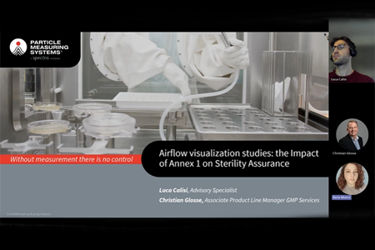Airflow Visualization Studies: The Impact Of Annex 1 On Sterility Assurance

With the implementation of the new Annex 1, airflow visualization techniques, such as Smoke Studies and Computational Fluid Dynamics (CFD) analyses, have become vital components of a company’s Contamination Control Strategy (CCS).
These studies are not only essential for qualifying cleanrooms and clean air equipment but, when properly conducted, can also support other critical evaluations. For example, they aid in defining environmental monitoring plans, training personnel, and determining the placement of biological and chemical indicators for validating VHP cycles.
But what does it mean to conduct these studies “properly”? Compliance with regulatory requirements is just one part of the equation; studies must also be scientifically robust to thoroughly assess airflow patterns and associated risks.
This webinar will delve into these critical aspects, emphasizing how to interpret and leverage the insights generated by airflow visualization to create a comprehensive and effective CCS.
What You’ll Learn:
- The role of smoke studies in Contamination Control Strategies
- Best practices for documenting flow visualizations
- Key requirements for executing smoke studies properly
- How to determine the frequency of smoke studies
Who Should Attend:
- Quality Assurance and Quality Control professionals
- Compliance and Validation Specialists
- Bioprocess Engineers
- Regulatory Affairs Specialists
- Manufacturing and Operations Managers
- R&D Personnel
- Pharmaceutical Researchers, Scientists, and Consultants
Get unlimited access to:
Enter your credentials below to log in. Not yet a member of Pharmaceutical Online? Subscribe today.
